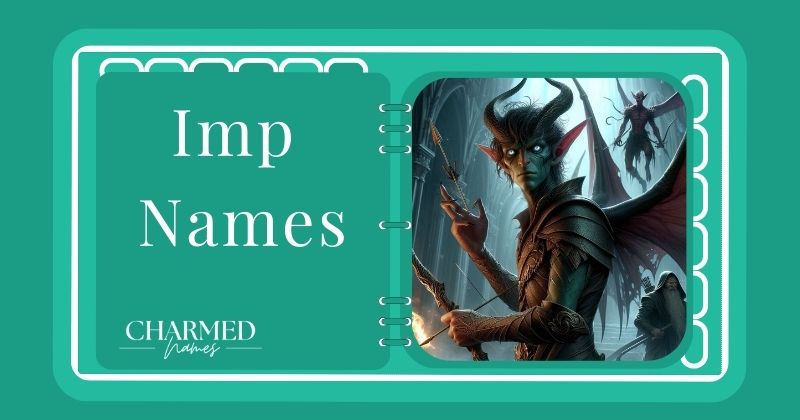Imps are small. Imps are fast. Imps love tricks. So, imp names sound short and sharp. These names match their bold spirit. You can use them for games, stories, or pets. Pick one that fits your tiny troublemaker.
Contents
1. Cute Imp Names (10 Names)
- Pim
- Zuzu
- Lilo
- Mip
- Tiki
- Nuni
- Ruru
- Koko
- Zibi
- Mimi
These names feel light. They fit small imps with soft hearts. These imps smile a lot. They jump around a lot too.
2. Funny Imp Names (10 Names)
- Snip
- Doodle
- Flik
- Gobbo
- Wib
- Pogo
- Zonk
- Bibi
- Wump
- Nib
Funny imps like loud jokes. They trip over their own feet. They make you laugh even when they try to be serious.
3. Dark Imp Names (10 Names)
- Grak
- Vorn
- Krill
- Darg
- Ruk
- Marn
- Svrik
- Grol
- Zurn
- Trik
These names sound deep. They fit imps from caves and shadows. They move fast and guard dark places.
4. Fire Imp Names (10 Names)
- Blim
- Spar
- Cind
- Rozu
- Ignin
- Fyro
- Flan
- Sizz
- Bren
- Luma
Fire imps glow. They flicker like flame. Their names spark and crack like heat.
5. Mischief Imp Names (10 Names)
- Tricks
- Zip
- Jinx
- Pick
- Skit
- Blink
- Rik
- Nip
- Ziv
- Wink
These imps love chaos. They hide things. They run. They giggle. They never sit still.
6. Cute Girl Imp Names (10 Names)
- Nila
- Sisi
- Rema
- Pila
- Lani
- Zera
- Kimi
- Tana
- Beli
- Fifi
Soft and sweet names. These fit tiny girl imps who glow like stars.
7. Imp Names for Games (10 Names)
- Drim
- Veko
- Rin
- Flit
- Krel
- Govi
- Trok
- Zuni
- Mev
- Riko
Short and fast names. Good for RPGs, fantasy worlds, and magic quests.
8. Classic Imp Names (10 Names)
- Puck
- Impis
- Greel
- Snat
- Brim
- Grob
- Vimp
- Helt
- Norg
- Drak
Old names used in tales. They feel timeless and bold.
Conclusion
Imp names should be short. They should feel quick. You can choose cute, dark, or funny names. Pick the one that matches your imp’s mood. These tiny beings may be wild, but a good name gives them color and charm.
FAQs
1. What makes a good imp name?
A good imp name is short, sharp, and fun to say.
2. Can imp names be cute?
Yes. Many imps have soft and playful names.
3. Are imp names good for games?
Yes. Short names fit fast characters.
4. Do dark imps need dark names?
It helps. Dark names feel strong and bold.
5. Can I make my own imp name?
Yes. Mix sounds and keep it simple.
